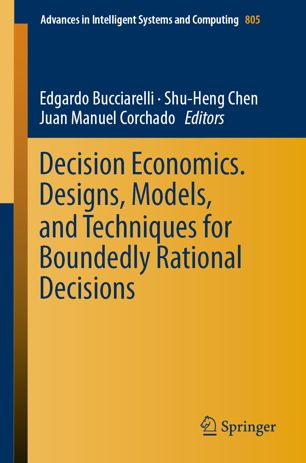

Most ebook files are in PDF format, so you can easily read them using various software such as Foxit Reader or directly on the Google Chrome browser.
Some ebook files are released by publishers in other formats such as .awz, .mobi, .epub, .fb2, etc. You may need to install specific software to read these formats on mobile/PC, such as Calibre.
Please read the tutorial at this link: https://ebookbell.com/faq
We offer FREE conversion to the popular formats you request; however, this may take some time. Therefore, right after payment, please email us, and we will try to provide the service as quickly as possible.
For some exceptional file formats or broken links (if any), please refrain from opening any disputes. Instead, email us first, and we will try to assist within a maximum of 6 hours.
EbookBell Team

5.0
50 reviewsThe special session on Decision Economics (DECON) is a scientific forum held annually, which is focused on sharing ideas, projects, research results, models, and experiences associated with the complexity of behavioural decision processes and socio‐economic phenomena. In 2018, DECON was held at Campus Tecnológico de la Fábrica de Armas, University of Castilla-La Mancha, Toledo, Spain, as part of the 15th International Conference on Distributed Computing and Artificial Intelligence.
For the third consecutive year, this book have drawn inspiration from Herbert A. Simon’s interdisciplinary legacy and, in particular, is devoted to designs, models, and techniques for boundedly rational decisions, involving several fields of study and expertise. It is worth noting that the recognition of relevant decision‐making takes place in a range of critical subject areas and research fields, including economics, finance, information systems, small and international business management, operations, and production. Therefore, decision‐making issues are of fundamental importance in all branches of economics addressed with different methodological approaches.
As a matter of fact, the study of decision‐making has become the focus of intense research efforts, both theoretical and applied, forming a veritable bridge between theory and practice as well as science and business organisations, whose pillars are based on insightful cutting‐edge experimental, behavioural, and computational approaches on the one hand, and celebrating the value of science as well as the close relationship between economics and complexity on the other.
In this respect, the international scientific community acknowledges Herbert A. Simon’s research endeavours to understand the processes involved in economic decision‐making and their implications for the advancement of economic professions. Within the field of decision‐making, indeed, Simon has become a mainstay of bounded rationality and satisficing. His rejection of